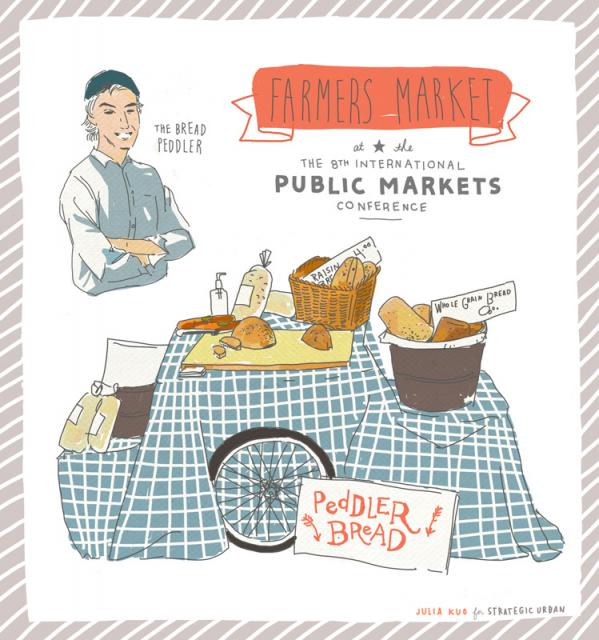The Community of the Farmers Market
As David O’Neil pointed out in my interview with him a couple weeks ago, one of the great things about this international public markets conference is being able to talk to other people who are passionate about markets. I had a chance to sit in on a discussion surrounding farmers markets. It was a great setting where people who run farmers markets or who organize them got a chance to hear the issues that other markets were having and offer advice, and in many cases, commiserate and encourage.
This discussion group was a true example of the international nature of the conference. There were at least four individuals from Canada and one from Poland. The rest of the discussion participants were from all over the United States with nine states represented altogether. That’s pretty good for a total of about 20 people. Interestingly, that although there were geographic differences between participants, the issues discussed were very universal. The topics discussed ranged from management, attracting customers and vendors, and marketing to local growers vs. commodity growers, and funding.
Here is just a brief glimpse at some of the difficulties that farmers markets deal with as they operate, and some of the solutions they have found to these difficulties.
Farmers markets seem to be all over now. There has been a big growth in the number of markets in the U.S. since the country started keeping count again in 1996. However, is there such a thing as too many markets? Several of the discussion participants last Friday would agree that, yes, there is such a thing as too many markets. It is not because they think that people should go to the ones that already exist and they want to discourage people from opening markets in their area, but because having too many markets can stress out growers and local farmers. These farmers can find it hard to supply five markets in their area all at the same time. Another repercussion of too many markets is the fact that the customer based gets split up or that an over abundance of markets does not allow for effective competition, but instead drives prices down to a point where it is not worth it for the farmer to sell his/her goods.
The financial sides of markets can also be treacherous, especially when markets apply for funding or sponsorships. Most markets can apply for grants and funds that have to do with community development, but having community partners that supply money to these markets can be a tough relationship to navigate. Many community partners will try and shape the market, citing that they want their money spent in a certain way. This is tricky because the historical foundations of many markets rest with the vendors and not with an association or nonprofit that might be organizing and running them now. The ownership of the market thus gets compromised in the process of making them more established parts of our communities. It is important for farmers markets to choose appropriate community partners.
Most consumers associate farmers markets with selling summer produce, a temporary thing, so making these markets relevant within the established community can be a challenge. Farmers markets have made it part of their mission in many cases to give back to their communities by donating their food to food pantries and shelters when there is an excess. This engagement with social outreach in their communities helps to keep these markets relevant outside of their summer seasons. Additionally, some markets have asked their patrons to donate extra produce from their own gardens to benefit food pantries and shelters as well. Instead of simply selling produce, these farmers markets are making themselves valued parts of their community.
As summer wanes and the harvest for this year is coming to an end, take a last trip or two to the farmers market near you with maybe a better understanding of the channels of bringing food from farm to market to table.









Leave a Reply